Cost Of Hardwood Vs Laminate
Deciding between hardwood flooring and laminate can be a challenge for homeowners. Interestingly, the cost of hardwood vs laminate varies based on several factors.
This article will compare these two popular flooring options to help you make an informed decision.
Keep reading to find out more!
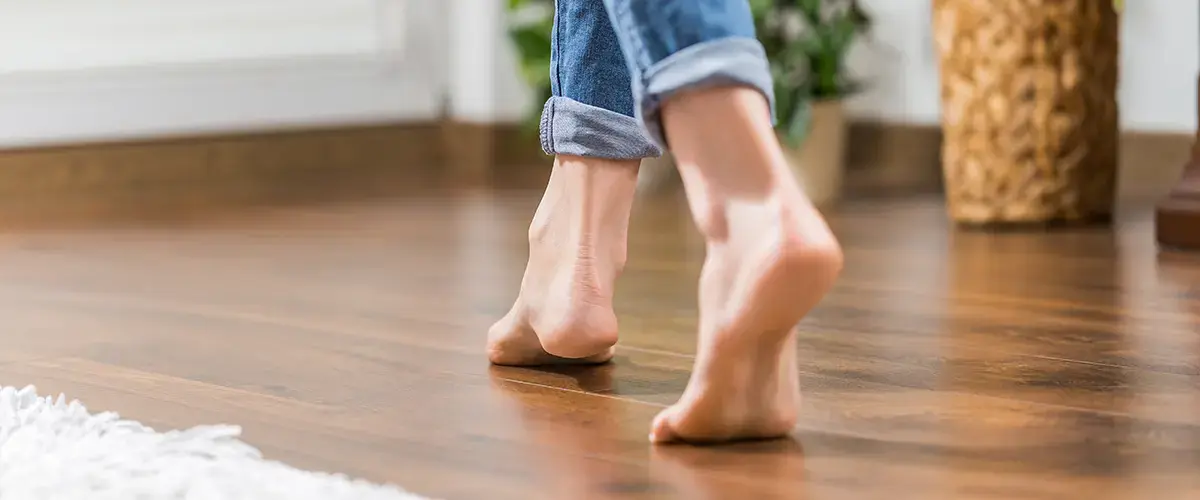
Key Takeaways
- Hardwood flooring is natural and can be sanded/refinished. Laminate looks like wood but can't be refinished.
- Laminate costs $1 to $6 per square foot; hardwood is pricier at $5 to $15 per square foot, not including installation.
- Hardwood lasts decades with proper maintenance, while laminate has a lifespan of 15-25 years.
- Installing laminate is cheaper than hardwood. You might pay $2 to $8 per square foot for laminate installation versus $4 to $12 for hardwood.
- Homes with hardwood floors often sell for more money than those with laminate, making it a good investment.
Key Differences Between Hardwood and Laminate Flooring
Composition and appearance
Laminate flooring combines several layers, including a core layer of high density fiberboard, topped with a decorative layer that mimics the look of real wood. Its surface is finished with a clear wear layer for added durability.
This structure allows laminate floors to replicate the appearance of natural wood, engineered hardwood, or even other materials like stone.
Solid hardwood flooring, on the other hand, is made from single pieces of natural wood. Its beauty comes from the unique patterns and colors found in real wood species such as oak, maple, or cherry.
Solid hardwood floors bring a touch of natural beauty into any living space. They can be sanded and refinished multiple times to restore their original luster or to change their finish.
Durability
Hardwood floors boast toughness and can last for decades with proper maintenance. They resist scratches and dents better than most flooring types, making them ideal for high traffic areas.
But, they might not hold up as well in very damp environments or against prolonged moisture exposure without waterproof finish. Solid hardwood requires periodic refinishing to maintain its appearance and durability.
Laminate flooring offers a durable top wear layer that protects against scratches, stains, and fading from sunlight. It’s made to handle heavy use and is often chosen for places with lots of foot traffic.
While laminate can mimic the look of real hardwood or even stone, it cannot be refinished like solid wood if it gets damaged. However, installing laminate flooring includes a foam underlayment that helps with moisture resistance, adding to its lifespan in various conditions.
Upkeep
Taking care of laminate flooring is generally easier than maintaining real hardwood flooring. Laminate boards are designed to resist scratches and stains more effectively. They can simply be swept or vacuumed for regular cleaning, and spills wipe up with ease without the need for special cleaners.
For deeper cleans, a damp mop does the job well, but avoid soaking them as water can seep into the seams.
Proper care of hardwood floors requires a bit more effort. They should be swept or vacuumed regularly to prevent dirt from scratching the surface. When needed, use cleaners specifically made for hardwood.
Over time, you might have to sand down and refinish natural wood floors to erase deep scratches or dents. Always protect them from water spills by wiping them up immediately, and keep an eye on humidity levels in your home to prevent warping.
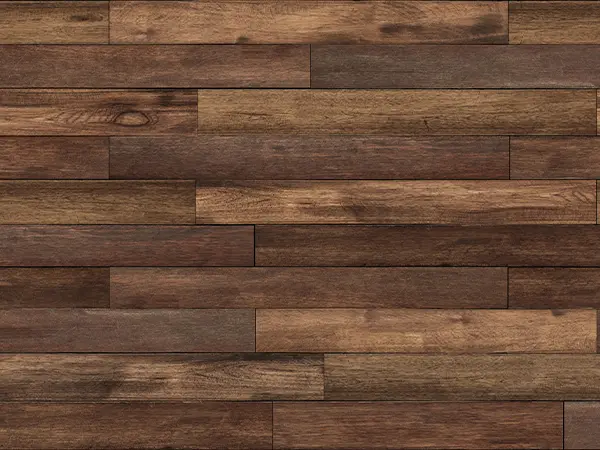
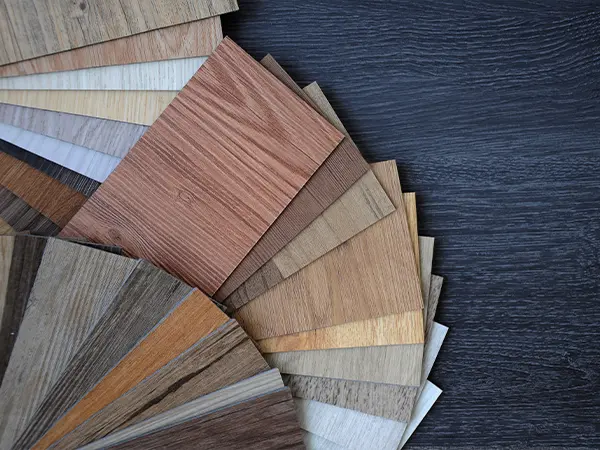
Best Manufacturers of Hardwood and Laminate Flooring
Selecting quality hardwood or laminate flooring starts with choosing a reputable manufacturer known for their craftsmanship and durability.
- Armstrong Flooring Renowned for innovative designs and reliable products, Armstrong is a trusted name in both hardwood and laminate flooring.
- Pergo Pioneers of laminate flooring, Pergo offers an array of stylish and highly durable laminate flooring options.
- Mohawk Industries Mohawk provides a diverse range of flooring, combining beauty and resilience in both their hardwood and laminate selections.
- Shaw Floors Shaw excels in producing versatile and high-quality flooring options, ensuring long-lasting performance in any space.
- Bruce Flooring Specializing in American hardwoods, Bruce offers timeless and elegant hardwood flooring solutions for a variety of homes.
Cost Comparison of Hardwood and Laminate Flooring
- Initial cost
When comparing the initial cost, laminate flooring is generally more budget-friendly. On the other hand, hardwood flooring can be significantly pricier.
Moving on from the initial cost aspect of both flooring options, now let’s delve into their long-term and installation costs.
Next up: Long-term cost – Hardwood vs Laminate Flooring
- Long-term cost
When comparing long-term costs, hardwood flooring generally requires more maintenance and refinishing over time compared to laminate. Hardwood may need refinishing every 3-7 years, which can add up in terms of both time and money.
On the other hand, laminate flooring has a hard surface that is resistant to scratches and fading, reducing the need for regular maintenance or refinishing. This means that homeowners can benefit from lower long-term costs with laminate flooring due to its durability and minimal upkeep requirements.
In addition, it’s important to consider the potential lifespan of each type of flooring. While hardwood floors can last for decades when properly maintained, laminate flooring also offers a durable option with a lifespan averaging 15-25 years.
This longer lifespan of hardwood should be considered when looking at long-term cost as it signifies less frequent replacements compared to laminate options.
- Installation cost
When considering the installation cost of hardwood and laminate flooring, it’s essential to note that laminate is generally more affordable to install than hardwood. Keep in mind that these costs may vary based on factors such as the region, labor charges, and additional materials needed for preparation.
Furthermore, homeowners should factor in the subfloor condition when budgeting for installation costs. Subfloors require different preparations depending on whether you choose laminate or hardwood, which can impact overall expenses.
It’s advisable to seek quotes from reputable contractors and compare their estimates with your plans and budget before making a decision.
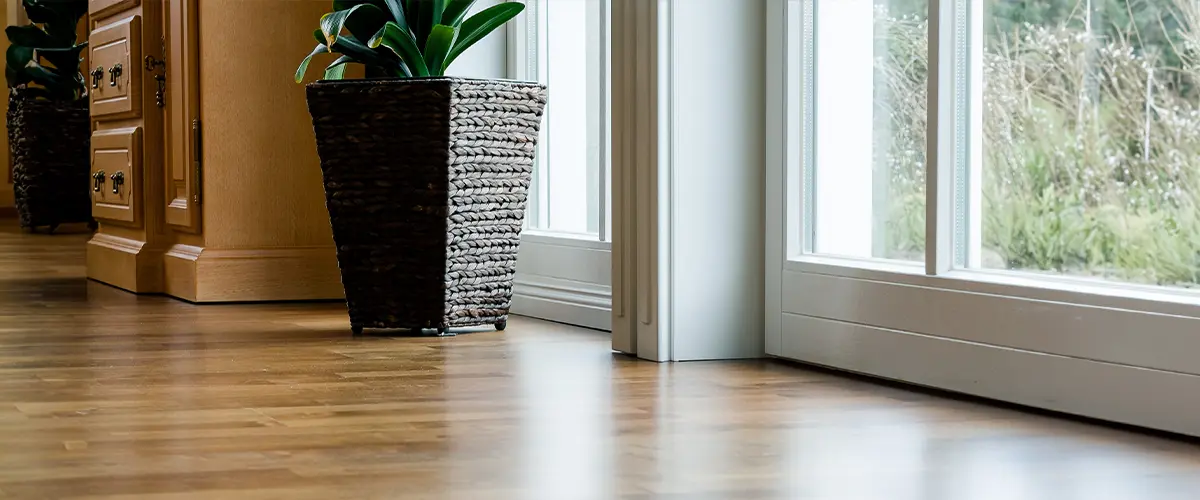
Factors to Consider When Choosing Between Hardwood and Laminate
- Appearance and comfort
When choosing between hardwood and laminate flooring, consider the appearance and comfort each option offers. Hardwood floors provide a timeless, natural look with variations in grain patterns, while laminate flooring can mimic the appearance of wood or other materials at a lower cost.
In terms of comfort underfoot, hardwood offers warmth and a solid feel, whereas laminate may not absorb sound as well but can be more cushioned with an underlayment.
Maintenance-wise, hardwood requires regular cleaning and occasional refinishing to maintain its luster, while laminate is easier to clean but may need replacement if damaged. Additionally, homeowners seeking water-resistant flooring should note that some types of laminate offer this feature effectively.
When considering these factors along with personal preferences for style and maintenance ease, homeowners can make an informed decision about which flooring type best suits their needs.
- Maintenance and care
When it comes to maintenance and care, laminate flooring is easier to clean and maintain compared to hardwood. Laminate has a protective wear layer that makes it resistant to stains, scratches, and fading.
Regular sweeping or vacuuming with a soft brush attachment keeps laminate floors free from dust and debris. Occasional damp mopping with a manufacturer-recommended cleaner helps retain its luster.
On the other hand, hardwood requires regular sweeping or vacuuming using a floor attachment without a beater bar to prevent scratches. Additionally, hardwood needs periodic refinishing to maintain its appearance and protect against moisture.
Hardwood floors need prompt spill cleanup to prevent damage. They require more upkeep, like refinishing every few years due to scratches from traffic or pets, especially with less dense woods like oak and maple.
Finishes wear off quicker, needing frequent deep cleanings and leading to minor dents and warping from humidity, causing cupping edges and dips in changing climates.
- Lifespan
When it comes to the lifespan of flooring, hardwood has a longer lifespan compared to laminate. Hardwood floors can last for decades, and some even centuries if well-maintained. Laminate flooring typically has a lifespan of around 15-25 years with proper care.
Homeowners should consider the longevity of their flooring when choosing between hardwood and laminate. While hardwood may require more upfront investment, its extended lifespan provides long-term value and durability.
On the other hand, laminate offers an affordable option with a respectable lifespan but may need replacement sooner than hardwood.
- Water and heat resistance
Hardwood flooring is typically less resistant to water and heat compared to laminate. Laminate, being a synthetic material, tends to be more resistant to moisture and temperature fluctuations.
This makes it a better choice for areas prone to humidity or where radiant heating systems are installed. However, both hardwood and laminate can suffer damage if exposed to standing water for prolonged periods or extreme heat.
When considering the water and heat resistance of flooring options, homeowners should weigh factors like potential exposure and maintenance requirements along with their lifestyle.
Taking into account these considerations can help in making an informed decision about which type of flooring will best suit their needs.
Impact on Resale Value
Effect on property value
When it comes to property value, hardwood flooring tends to have a higher impact compared to laminate. Studies show that homes with hardwood floors often sell for a higher price and are more attractive to potential buyers.
The luxurious and timeless appeal of hardwood flooring adds significant value to a property, making it a worthwhile investment for homeowners looking to increase the resale value of their home.
Not only do hardwood floors add charm and elegance, but they also offer durability and longevity, contributing positively to the overall property value. Homeowners should consider this when making decisions about their flooring options in order to make an informed choice that will benefit them in the long run.
Return on investment
Considering the effect on property value, it’s worth noting that hardwood flooring tends to yield a higher return on investment compared to laminate. According to real estate experts, homes with hardwood floors can often sell for more and attract buyers more quickly than those with laminate flooring.
A national survey of real estate agents found that 54% believe homes with hardwood floors are easier to sell, while 90% say they could command a higher price.
When it comes to return on investment, hardwood flooring justifies its initial cost over time due to its durability and timeless appeal. This makes it a solid choice for homeowners looking to enhance both their living space and resale value.
When comparing the two options, this significant impact on resale value is crucial for long-term financial considerations.
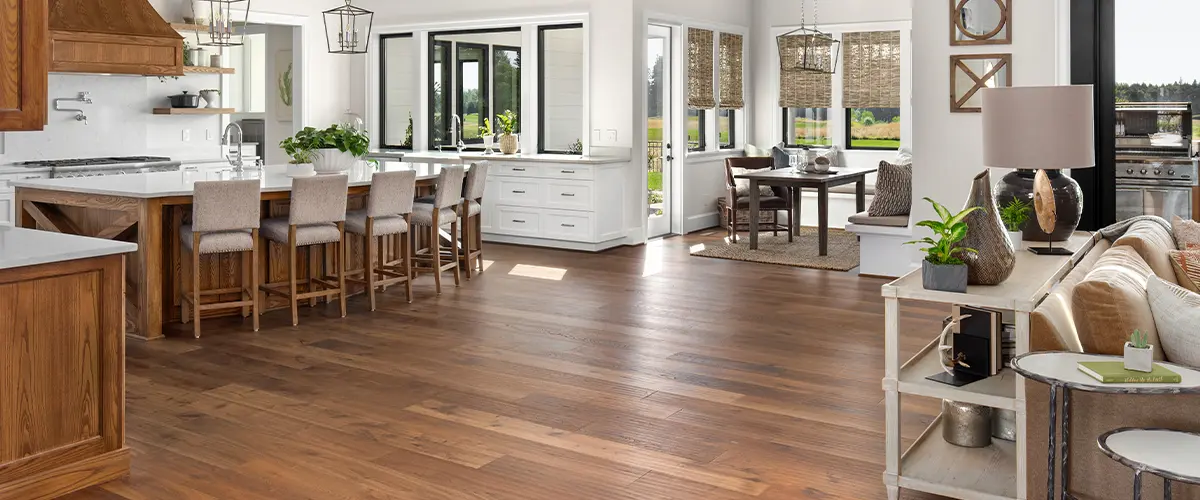
Cost Of Hardwood vs Laminate - FAQs
Hardwood has thicker wear layers that can withstand damage better over time compared to most laminate floors.
However, some types of engineered wood and laminates come with water-resistant backing layers that add extra protection against moisture damage.
Enjoy Perfect Results & Skip The Hard Work
If you live in Alpharetta and you’re ready to get your project tackled by our team of industry experts, contact us at so we can get started.
